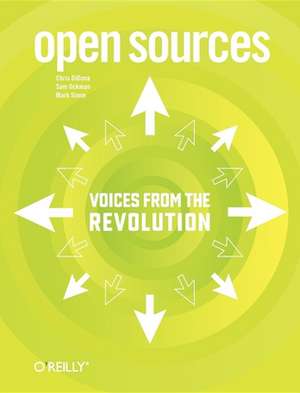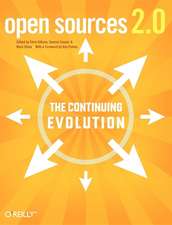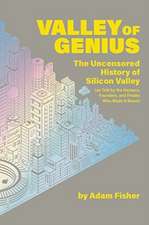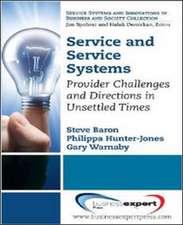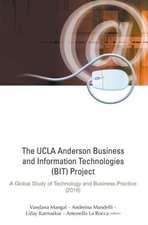Open Sources – Voices from the Open Source Revolution: O'Reilly Ser.
Autor Chris Dibonaen Limba Engleză Paperback – 21 feb 1999
Din seria O'Reilly Ser.
- 20%
 Preț: 330.00 lei
Preț: 330.00 lei - 20%
 Preț: 200.96 lei
Preț: 200.96 lei - 20%
 Preț: 135.83 lei
Preț: 135.83 lei -
 Preț: 186.15 lei
Preț: 186.15 lei - 20%
 Preț: 140.22 lei
Preț: 140.22 lei - 20%
 Preț: 218.63 lei
Preț: 218.63 lei - 20%
 Preț: 213.02 lei
Preț: 213.02 lei - 20%
 Preț: 171.22 lei
Preț: 171.22 lei - 20%
 Preț: 244.63 lei
Preț: 244.63 lei - 20%
 Preț: 178.14 lei
Preț: 178.14 lei - 20%
 Preț: 136.36 lei
Preț: 136.36 lei - 20%
 Preț: 198.36 lei
Preț: 198.36 lei - 20%
 Preț: 232.48 lei
Preț: 232.48 lei - 20%
 Preț: 246.11 lei
Preț: 246.11 lei - 20%
 Preț: 317.36 lei
Preț: 317.36 lei - 20%
 Preț: 78.44 lei
Preț: 78.44 lei - 20%
 Preț: 191.44 lei
Preț: 191.44 lei - 20%
 Preț: 174.80 lei
Preț: 174.80 lei - 20%
 Preț: 127.64 lei
Preț: 127.64 lei - 20%
 Preț: 197.99 lei
Preț: 197.99 lei - 20%
 Preț: 232.58 lei
Preț: 232.58 lei - 20%
 Preț: 167.52 lei
Preț: 167.52 lei - 20%
 Preț: 259.58 lei
Preț: 259.58 lei - 20%
 Preț: 186.42 lei
Preț: 186.42 lei - 20%
 Preț: 195.20 lei
Preț: 195.20 lei - 20%
 Preț: 180.56 lei
Preț: 180.56 lei - 20%
 Preț: 197.62 lei
Preț: 197.62 lei - 20%
 Preț: 192.00 lei
Preț: 192.00 lei - 20%
 Preț: 236.40 lei
Preț: 236.40 lei - 20%
 Preț: 253.66 lei
Preț: 253.66 lei - 20%
 Preț: 113.47 lei
Preț: 113.47 lei - 20%
 Preț: 214.17 lei
Preț: 214.17 lei - 20%
 Preț: 191.24 lei
Preț: 191.24 lei - 20%
 Preț: 174.44 lei
Preț: 174.44 lei - 20%
 Preț: 286.88 lei
Preț: 286.88 lei - 20%
 Preț: 139.70 lei
Preț: 139.70 lei - 20%
 Preț: 128.92 lei
Preț: 128.92 lei - 20%
 Preț: 280.91 lei
Preț: 280.91 lei - 20%
 Preț: 134.77 lei
Preț: 134.77 lei - 20%
 Preț: 259.38 lei
Preț: 259.38 lei - 20%
 Preț: 170.11 lei
Preț: 170.11 lei -
 Preț: 148.23 lei
Preț: 148.23 lei - 20%
 Preț: 202.27 lei
Preț: 202.27 lei - 20%
 Preț: 243.52 lei
Preț: 243.52 lei -
 Preț: 204.30 lei
Preț: 204.30 lei - 20%
 Preț: 161.70 lei
Preț: 161.70 lei - 20%
 Preț: 163.19 lei
Preț: 163.19 lei - 20%
 Preț: 127.56 lei
Preț: 127.56 lei - 20%
 Preț: 201.90 lei
Preț: 201.90 lei
Preț: 140.22 lei
Nou
Puncte Express: 210
Preț estimativ în valută:
26.83€ • 28.01$ • 22.21£
26.83€ • 28.01$ • 22.21£
Carte disponibilă
Livrare economică 14-28 martie
Preluare comenzi: 021 569.72.76
Specificații
ISBN-13: 9781565925823
ISBN-10: 1565925823
Pagini: 288
Dimensiuni: 177 x 232 x 19 mm
Greutate: 0.48 kg
Editura: O'Reilly
Seria O'Reilly Ser.
ISBN-10: 1565925823
Pagini: 288
Dimensiuni: 177 x 232 x 19 mm
Greutate: 0.48 kg
Editura: O'Reilly
Seria O'Reilly Ser.
Cuprins
Chapter 1: Acknowledgments; Chapter 1: Introduction; 1.1 Prologue; 1.2 What Is Free Software and How Does It Relate to Open Source?; 1.3 What Is Open Source Software?; 1.4 The Dark Side of the Force; 1.5 Use the Source, Luke; 1.6 Innovation Through the Scientific Method; 1.7 Perils to Open Source; 1.8 Motivating the Open Source Hacker; 1.9 The Venture and Investment Future of Linux; 1.10 Science and the New Renaissance; Chapter 2: A Brief History of Hackerdom; 2.1 Prologue: The Real Programmers; 2.2 The Early Hackers; 2.3 The Rise of Unix; 2.4 The End of Elder Days; 2.5 The Proprietary Unix Era; 2.6 The Early Free Unixes; 2.7 The Great Web Explosion; Chapter 3: Twenty Years of Berkeley Unix: From AT&T-Owned to Freely Redistributable; 3.1 Early History; 3.2 Early Distributions; 3.3 VAX Unix; 3.4 DARPA Support; 3.5 4.2BSD; 3.6 4.3BSD; 3.7 Networking, Release 1; 3.8 4.3BSD-Reno; 3.9 Networking, Release 2; 3.10 The Lawsuit; 3.11 4.4BSD; 3.12 4.4BSD-Lite, Release 2; Chapter 4: The Internet Engineering Task Force; 4.1 The History of the IETF; 4.2 IETF Structure and Features; 4.3 IETF Working Groups; 4.4 IETF Documents; 4.5 The IETF Process; 4.6 Open Standards, Open Documents, and Open Source; Chapter 5: The GNU Operating System and the Free Software Movement; 5.1 The First Software-Sharing Community; 5.2 The Collapse of the Community; 5.3 A Stark Moral Choice; 5.4 Free as in Freedom; 5.5 GNU Software and the GNU System; 5.6 Commencing the Project; 5.7 The First Steps; 5.8 GNU Emacs; 5.9 Is a Program Free for Every User?; 5.10 Copyleft and the GNU GPL; 5.11 The Free Software Foundation; 5.12 Free Software Support; 5.13 Technical Goals; 5.14 Donated Computers; 5.15 The GNU Task List; 5.16 The GNU Library GPL; 5.17 Scratching an Itch?; 5.18 Unexpected Developments; 5.19 The GNU HURD; 5.20 Alix; 5.21 Linux and GNU/Linux; 5.22 Challenges in Our Future; 5.23 "Open Source"; 5.24 Try!; Chapter 6: Future of Cygnus Solutions: An Entrepreneur's Account; 6.1 Cygnus in the Early Years; 6.2 GNUPro; 6.3 Challenges; 6.4 Getting Funded Beyond Open Source-eCos; 6.5 Reflections and Vision of the Future; Chapter 7: Software Engineering; 7.1 The Software Engineering Process; 7.2 Testing Details; 7.3 Open Source Software Engineering; 7.4 Conclusions; Chapter 8: The Linux Edge; 8.1 Amiga and the Motorola Port; 8.2 Microkernels; 8.3 From Alpha to Portability; 8.4 Kernel Space and User Space; 8.5 GCC; 8.6 Kernel Modules; 8.7 Portability Today; 8.8 The Future of Linux; Chapter 9: Giving It Away: How Red Hat Software Stumbled Across a New Economic Model and Helped Improve an Industry; 9.1 Where Did Red Hat Come From?; 9.2 How Do You Make Money in Free Software?; 9.3 We Are in the Commodity Product Business; 9.4 The Strategic Appeal of This Model to the Corporate Computing Industry; 9.5 Licensing, Open Source, or Free Software; 9.6 The Economic Engine Behind Development of Open Source Software; 9.7 Unique Benefits; 9.8 The Great Unix Flaw; 9.9 It's Your Choice; Chapter 10: Diligence, Patience, and Humility; Chapter 11: Open Source as a Business Strategy; 11.1 It's All About Platforms; 11.2 Analyzing Your Goals for an Open-Source Project; 11.3 Evaluating the Market Need for Your Project; 11.4 Open Source's Position in the Spectrum of Software; 11.5 Nature Abhors a Vacuum; 11.6 Donate, or Go It Alone?; 11.7 Bootstrapping; 11.8 What License to Use?; 11.9 Tools for Launching Open Source Projects; Chapter 12: The Open Source Definition; 12.1 History; 12.2 KDE, Qt, and Troll Tech; 12.3 Analysis of the Open Source Definition; 12.4 Analysis of Licenses and Their Open Source Compliance; 12.5 Choosing a License; 12.6 The Future; Chapter 13: Hardware, Software, and Infoware; Chapter 14: Freeing the Source: The Story of Mozilla; 14.1 Making It Happen; 14.2 Creating the License; 14.3 Mozilla.org; 14.4 Behind the Curtain; 14.5 April Fool's Day, 1998; Chapter 15: The Revenge of the Hackers; 15.1 Beyond Brooks's Law; 15.2 Memes and Mythmaking; 15.3 The Road to Mountain View; 15.4 The Origins of "Open Source"; 15.5 The Accidental Revolutionary; 15.6 Phases of the Campaign; 15.7 The Facts on the Ground; 15.8 Into the Future; Appendix A: The Tanenbaum-Torvalds Debate; Appendix B: The Open Source Definition, Version 1.0; B.1 GNU General Public License; Appendix C: Contributors;
